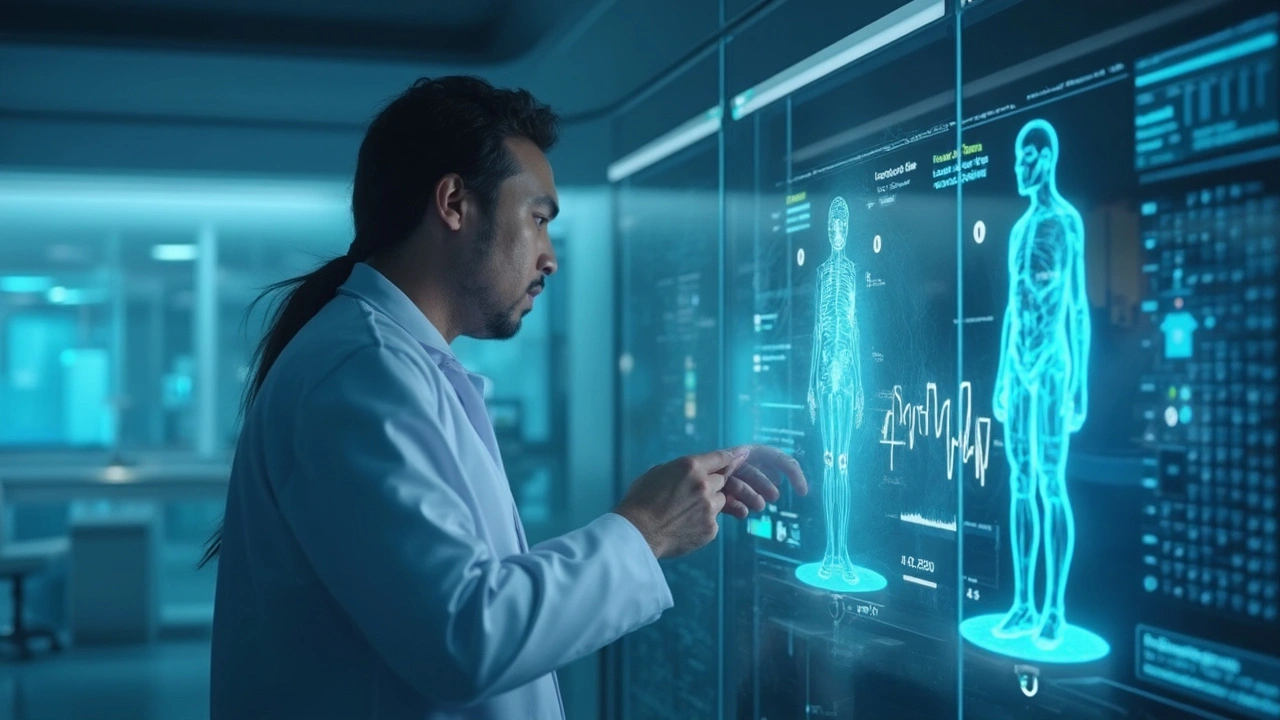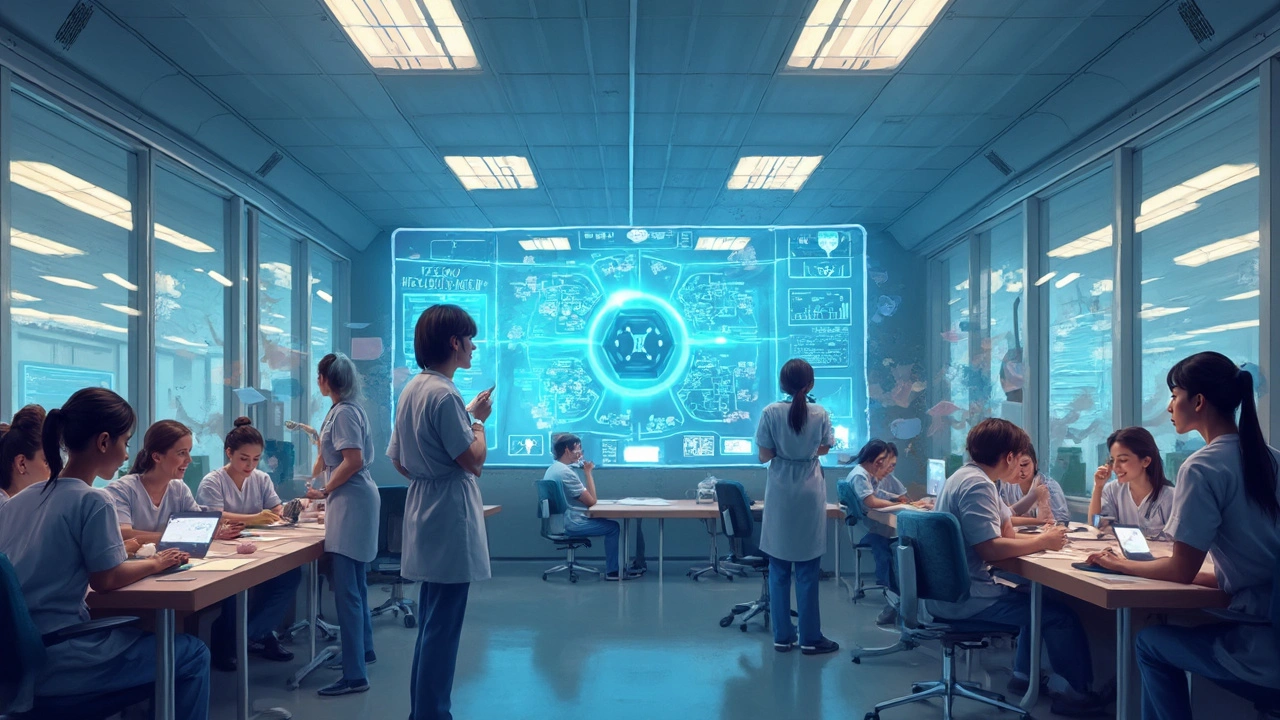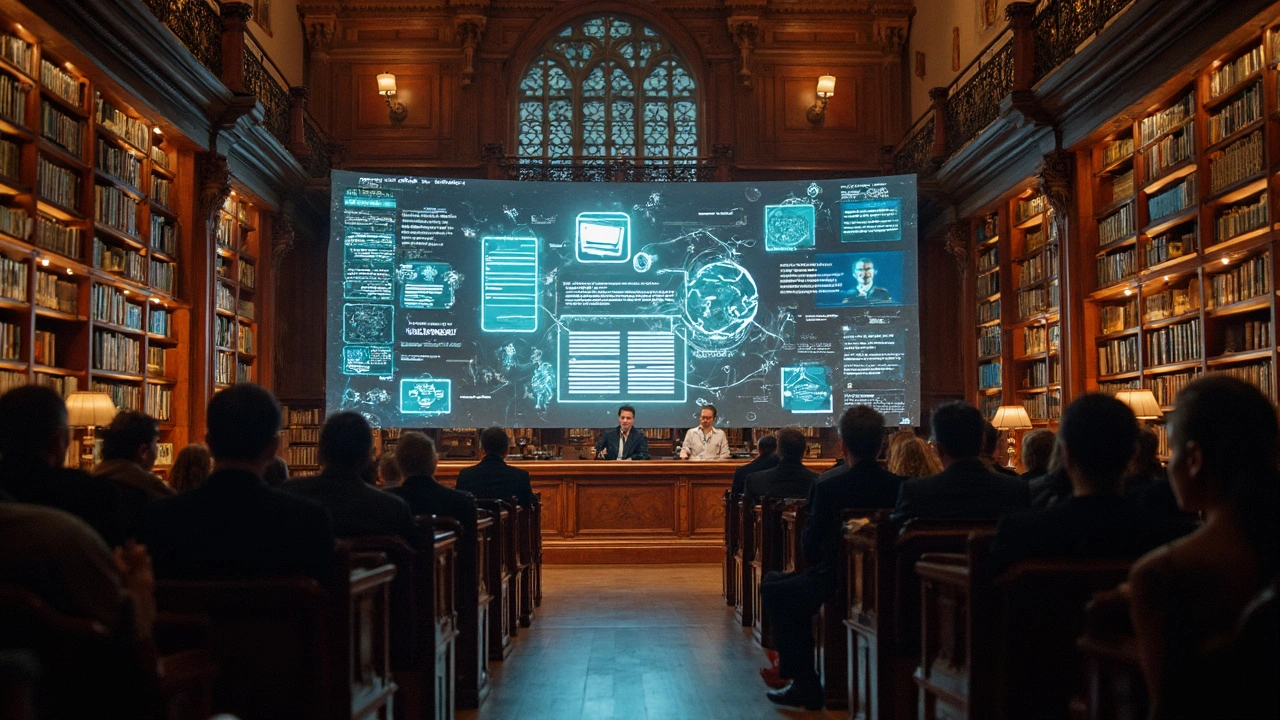AI in Healthcare: Revolutionizing Patient Care

Artificial intelligence is shaking things up in the healthcare sector like never before. Picture this: faster diagnostic processes, error reduction in patient records, and tailored treatment plans just for you. AI has got your back, making healthcare smarter and more efficient. But how exactly is AI rolling out the red carpet for better patient care?
First off, think about how AI helps in diagnosing illnesses. Machine learning algorithms can pour over scan results, medical records, and patient histories with a precision that sometimes surpasses human capability. We're talking about catching potential issues early, which can be a game-changer for treatment success.
On the other side, AI isn't only about crunching medical data. It's stepping in to handle the nitty-gritty of administrative tasks, too, like managing appointments and patient follow-ups. This means healthcare professionals can focus more on what they do best—caring for you.
- AI's Impact on Diagnosis and Treatment
- AI in Administrative Tasks and Workflow
- Personalized Medicine through AI
- Remote Monitoring and Telehealth
- Challenges and Ethical Considerations
AI's Impact on Diagnosis and Treatment
Artificial intelligence is making a big splash in the way healthcare professionals diagnose and treat illnesses. Imagine how cumbersome it used to be, sifting through tons of patient data manually. Now, with the power of AI, this process has become faster and more precise.
One of the standout contributions of AI in healthcare is its ability to interpret complex medical images. Radiologists, for example, now have machine learning tools that assist in detecting anomalies in X-rays, MRIs, and CT scans. This means potential issues can be flagged earlier, giving doctors a heads-up to start tackling problems right away.
Early Disease Detection and Precision
Did you know that AI systems can analyze patterns and predict diseases like cancer, often before symptoms become evident? This early detection is crucial because it can significantly improve the treatment outcomes. For instance, some AI models claim accuracy rates of over 90% in breast cancer detection, which is a huge leap forward.
In addition to early detection, AI is helping tailor treatments to individual patients—this is known as precision medicine. By analyzing a person's genetics and lifestyle, AI algorithms suggest the most effective treatment options. It's like having a bespoke treatment plan.
Streamlining the Treatment Process
AI chatbots and virtual assistants are also stepping up to streamline follow-ups and monitor patients' condition post-treatment. They remind patients about medication schedules or necessary lifestyle adjustments. This not only saves time for healthcare providers but also ensures continuous patient care.
All these advancements lead to one primary goal—improving patient care and outcomes. While AI is not about replacing doctors, its role in making healthcare more accurate and efficient is undeniable. Embracing AI technologies can help reduce diagnostic errors and ensure patients get the right care at the right time.
AI in Administrative Tasks and Workflow
Handling paperwork isn't exactly thrilling, right? It's routine, tedious, and takes up valuable time. But here's where AI comes in to save the day, making healthcare administration smoother and more efficient. By automating these tasks, healthcare providers can reduce errors and save precious time, all while focusing on patient care.
Let’s break it down. AI helps in streamlining scheduling like a pro. Automated systems can manage appointments, send reminders, and even adjust schedules based on staff availability or patient needs. This not only minimizes no-shows but also optimizes the use of resources—keeping everything running like a well-oiled machine.
And it's not just about scheduling. AI plays a role in handling electronic health records (EHR) too. By using AI, you reduce documentation errors and ensure faster access to patient information. This means when a doctor wants to see something specific, they aren’t rummaging through heaps of files. Instead, they have accurate data at their fingertips.
Have you heard about chatbots in healthcare? They're more common than you'd think. Chatbots help answer patient queries, assist with symptom checking, and guide patients to the right department—all without needing a human staff member to intervene! This is especially useful during after-hours.
Reduction of Operational Costs
By integrating AI solutions, healthcare facilities can cut operational costs significantly. Automated billing systems, for instance, help in reducing billing errors and detecting fraud. This ensures that financial resources are utilized efficiently, improving the overall budget management.
Here's a little stat attack for the geeks: According to a recent study, hospitals using AI for administrative tasks saw a more than 20% reduction in operational costs over two years. That’s real money which can then be redirected towards better facilities or patient services.
In essence, the adoption of AI in the administrative side of healthcare is not just about keeping up with technology. It’s about allowing healthcare workers to work smarter, not harder—making the system more effective for everyone involved.

Personalized Medicine through AI
Ever imagined a world where you get a medication or treatment plan created just for you? Thanks to AI, that's becoming a reality. In modern healthcare, AI isn't just about improving efficiency; it's about making medicine as personal as possible.
The magic lies in AI's ability to analyze mountains of genetic data. By understanding your genetic makeup, AI can predict how you might respond to specific treatments, suggesting the most effective options for your case. This is what makes personalized medicine so revolutionary.
Genomic Analysis
AI tools can quickly sift through complex genetic data to identify mutations that might lead to disease. This helps in catching conditions early or even preventing them. For example, if there's a genetic marker for cancer, AI can spot it faster than traditional methods.
Creating Tailored Treatment Plans
AI-driven models factor in everything from a patient’s genetic profile to their lifestyle when suggesting treatments. This plays a critical role in choosing the right medication dosage, reducing side effects, and improving outcomes. No more one-size-fits-all approach!
- Reduced trial and error with medication.
- Increased efficacy of treatments.
- Better patient satisfaction and outcomes.
How AI Makes a Difference
Consider condition-specific treatments like diabetes care. AI can monitor blood sugar levels continually and adjust insulin dosages in real-time, offering a personalized care routine that fits seamlessly into a patient’s daily life.
| Benefit | Impact |
|---|---|
| Fewer adverse drug reactions | 73% Reduction |
| Decrease in overall healthcare costs | Estimated 40% Savings |
The takeaway here is simple but powerful: AI-enabled personalized medicine not only boosts the efficacy of treatments but also empowers patients by involving them more in their own care. That's a win-win for everyone!
Remote Monitoring and Telehealth
Ever wonder how you can have a doctor's appointment without leaving your couch? That's where AI in healthcare shines with remote monitoring and telehealth. These technological advances mean your health isn't restricted to a clinic visit.
Remote monitoring lets healthcare providers keep tabs on you in real time, right from the comfort of your home. Sensors and wearable devices like smartwatches track vital signs like heart rate and blood pressure. They can even alert doctors when something seems off, potentially catching issues before they become serious.
Telehealth is another marvel, bringing medical consultations over video chats to your living room. It's a game-changer, especially for folks in rural areas or those with mobility issues. No more travel hassles or waiting rooms; just personalized care at your fingertips.
The Role of AI in Telehealth
AI isn't just a spectator here. It helps in improving the accuracy of virtual consultations. Imagine AI tools that analyze speech patterns during calls to detect early signs of issues like depression or even heart disease. It's like having a digital assistant alongside your healthcare professional.
Advantages of Remote Monitoring and Telehealth
- Convenience: No need for frequent trips, saving time and money.
- Early Detection: Constant monitoring can detect potential issues early on.
- Access to Specialists: Even in remote areas, telehealth bridges gaps, connecting patients with specialists worldwide.
These advances are positioning AI as a revolutionary force in patient care, making healthcare not only more accessible but also more efficient. With these tools, staying on top of your health is more manageable than ever.
| Feature | Advantage |
|---|---|
| Remote Monitoring | Real-time health tracking |
| Telehealth | Access to care anywhere |

Challenges and Ethical Considerations
Diving into the world of AI in healthcare, it’s clear that while the tech brings a lot of good, there are bumps along the road we can't overlook. It's important to address these challenges to make sure artificial intelligence remains a force for good in patient care.
Data Privacy Concerns
One biggie is safeguarding patient info. AI systems need loads of data to function effectively, but with high-profile data breaches, keeping sensitive medical records secure is a priority. Patients need to trust that their personal health info won't be misused, and that's a challenge that tech developers and healthcare providers are still figuring out.
AI Decision Transparency
Then there's the matter of AI making decisions. How do these systems actually decide on a diagnosis or a treatment plan? The "black box" problem, where we don't quite understand how AI systems come to a conclusion, raises ethical flags. Patients and doctors alike deserve to know the 'why' and 'how' behind AI-driven decisions.
Impact on Employment
The rise of AI could also change the job landscape significantly. While these technologies promise to handle routine tasks, there's a fear that many will lose jobs due to automation. It's vital to strike a balance, ensuring that AI complements rather than replaces human expertise.
Bias in AI Systems
Let's talk about bias. AI systems are as good as the data they're fed. If that data is skewed, the results could be too, potentially leading to misdiagnoses or unequal treatment. Building systems that prioritize fairness is crucial so that everyone gets the care they deserve.
| Ethical Concern | Implication |
|---|---|
| Data Privacy | Risk of breaches and trust issues |
| Decision Transparency | Need for clear explanation of AI processes |
| Employment Impact | Potential job loss and shifts in job roles |
| Bias | Unfair treatment or misdiagnoses |
Addressing these challenges involves a mix of strong regulations, continuous monitoring, and ethical framework development. As AI in healthcare evolves, keeping ethics at the forefront will ensure advancements benefit all patients.